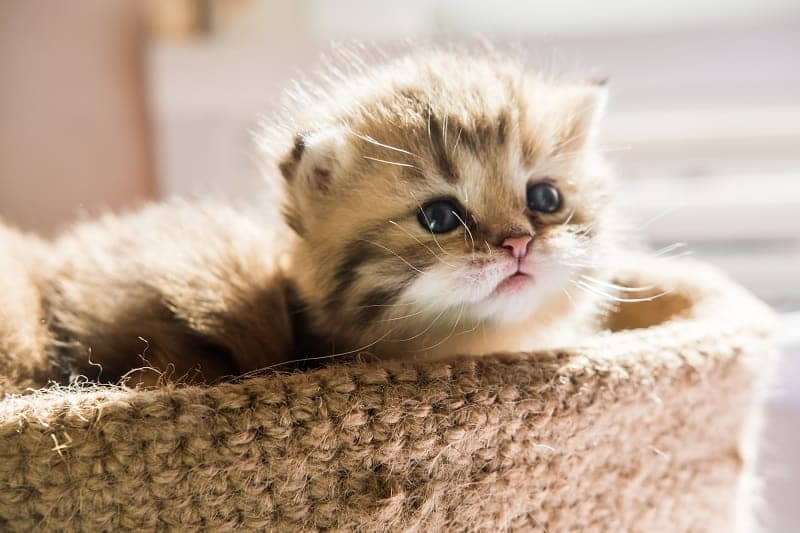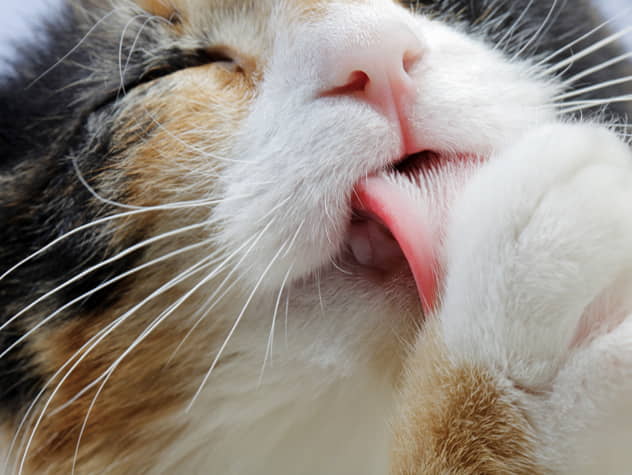You may have seen the refrigerator magnet that reads, “The only self-cleaning thing in this house is the cat.” Felines have a well-earned reputation as immaculate creatures.
“Healthy cats fastidiously groom themselves, ” says Victoria Voith, DVM, MSc, MA, PhD, DACVB, a professor in thenimal behavior at Western University of Health Sciences.
Although reports vary, a healthy cat grooms himself up to 50 percent of the waking day, Dr. Cynthia McManis of Just Cats Veterinary Services tells WebVet.com.

How do cats groom themselves?
The cat’s barbed tongue serves many purposes. It:
- Removes dead or loose fur
- Strips away the scent of food from the whiskers and the fur, reducing the chance of being detected by nearby predators
- Helps rid the coat of fleas and other parasites
- Increases circulation
- Controls body temperature
- Speeds healing
- Feels good
Do I need to give my cat a bath?
While most dogs need to be bathed frequently to fend off doggy odor, cats seldom require baths. They may need a close encounter with shampoo and water because they unleashed the wrath of a skunk or got into something unhealthy. Otherwise, regular baths simply aren’t necessary. However, cats still might need help cleaning their inner ears regularly as they cannot clean that themselves. Particularly if the cat scratches his ears of if there is smell in the ears. Over the age of 12 years, the majority of cats have some form of arthritis which might make them less flexible and less likely to be able to clean all parts of their body. (Find out more about grooming your cat.)
What if my cat isn’t grooming himself?
Cat parents can use their companion’s grooming habits to help gauge feline health. Too much or too little grooming can indicate that the cat has a health problem and needs to see a vet. And since a healthy cat should never smell, the presence of body odor or foul breath also requires a trip to the animal clinic. (Learn more about the subtle signs of a sick cat.)

But doesn’t the litter box make cats dirty?
For the same reason kitties have to scrub all traces of food from their coats, they also bury unconsumed prey: to remain invisible. They don’t want the neighborhood coyote to find the leftovers. Burying waste, a much appreciated trait according to most cat parents, also hides evidence from predators, and shields a kitty’s presence from more dominant cats.
“Cats will [bury their waste in] a litter box, if litter boxes are used [and provided] appropriately. You have to maintain [the box] and use substrate [litter] appropriately, ” Dr. Voith says.
What if my cat stops using the litter box?
According to Dr. Voith, cats may stray from proper hygiene if the kitty litter box goes unscooped for days or the substrate is offensive to the cat. Going outside the litter box could also be a warning that your cat is sick. As with a change in grooming habits, a departure from litter box etiquette is another cue you should take her to the vet. Every time you scoop, simply take a quick sniff of the remaining litter.
To keep kitty properly using her litter box, the pan should be scooped daily and changed whenever the litter itself begins to smell. When you start to notice the aroma of ammonia, it’s time to rinse out the box and refill with fresh litter.
How can I help my cat stay clean?
While all cats strive to keep themselves and their environment clean, you should have your feline friend spayed or neutered. Unaltered cats, both male and female, publish their personal ads in urine. Altering kitties cuts down on the possibility of marking inside the house. (Learn more about cat spraying.)
Keep your cat exclusively indoors, as indoor cats are at less risk of contracting disease and attracting parasites. (Learn more about indoor vs. outdoor cats.)
And remember, a happy cat is a clean cat.
Wondering about Cat Nail Trims and Nail Caps? Check it out on our latest post!
